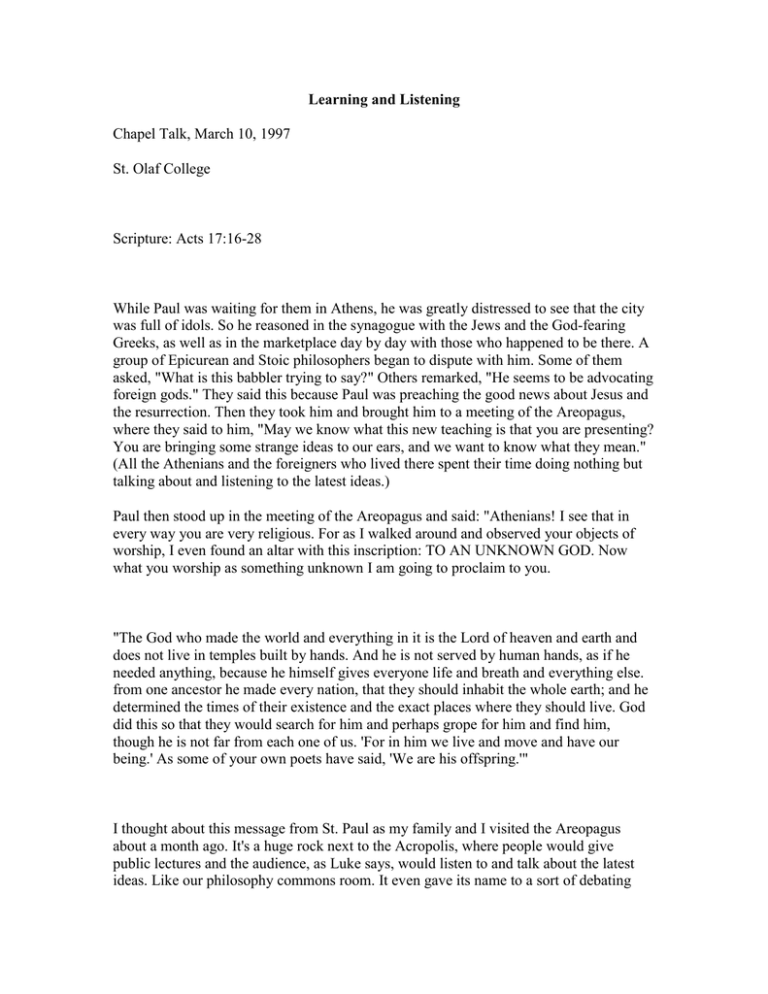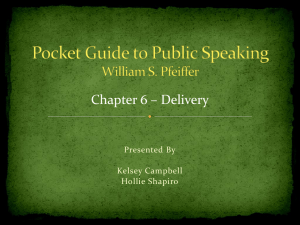Learning and Listening Chapel Talk, March 10, 1997 St. Olaf College
advertisement

Learning and Listening Chapel Talk, March 10, 1997 St. Olaf College Scripture: Acts 17:16-28 While Paul was waiting for them in Athens, he was greatly distressed to see that the city was full of idols. So he reasoned in the synagogue with the Jews and the God-fearing Greeks, as well as in the marketplace day by day with those who happened to be there. A group of Epicurean and Stoic philosophers began to dispute with him. Some of them asked, "What is this babbler trying to say?" Others remarked, "He seems to be advocating foreign gods." They said this because Paul was preaching the good news about Jesus and the resurrection. Then they took him and brought him to a meeting of the Areopagus, where they said to him, "May we know what this new teaching is that you are presenting? You are bringing some strange ideas to our ears, and we want to know what they mean." (All the Athenians and the foreigners who lived there spent their time doing nothing but talking about and listening to the latest ideas.) Paul then stood up in the meeting of the Areopagus and said: "Athenians! I see that in every way you are very religious. For as I walked around and observed your objects of worship, I even found an altar with this inscription: TO AN UNKNOWN GOD. Now what you worship as something unknown I am going to proclaim to you. "The God who made the world and everything in it is the Lord of heaven and earth and does not live in temples built by hands. And he is not served by human hands, as if he needed anything, because he himself gives everyone life and breath and everything else. from one ancestor he made every nation, that they should inhabit the whole earth; and he determined the times of their existence and the exact places where they should live. God did this so that they would search for him and perhaps grope for him and find him, though he is not far from each one of us. 'For in him we live and move and have our being.' As some of your own poets have said, 'We are his offspring.'" I thought about this message from St. Paul as my family and I visited the Areopagus about a month ago. It's a huge rock next to the Acropolis, where people would give public lectures and the audience, as Luke says, would listen to and talk about the latest ideas. Like our philosophy commons room. It even gave its name to a sort of debating society that met there regularly, so the Stoic and Epicurean philosophers could argue with one another and then gang up on a visitor like St. Paul, who taught something new under the Athenian sun. But it wasn't just our climbing the ancient steps carved into the Areopagus that made me think about Paul's message; Lois and I had just finished supervising St. Olaf's Term in the Middle East and the students and we had stretched and struggled for five months with some of the ideas Paul discussed. For example, how different can our theologies be and yet one can still say we are referring to the same God? Certainly traveling in the Middle East raises the question whether Jews, Christians, and Muslims worship the same God. For that matter, one encounters Greek Orthodox, Egyptian Copts, and Syrian Malekites that argue not just about real estate in the Church of the Holy Sepulcher, but also about trinitarian issues that reveal a surprising diversity of views about the nature of God. Of course, our merely having different ideas about God doesn't mean we aren't referring to the same being, any more than our having different ideas about a mutual friend prevents us from talking about and loving the same person. In fact, when it comes to the details, the nuances and connotations, we probably all have somewhat different ideas about everyone, including Pastor Benson, for example, to say nothing of God. Still, if you think Pastor Benson is the President of Carleton College and the mother of four boys, then I can wonder whether we are referring to the same person. Likewise, if you believe in the incarnation while I am absolutely appalled at the sacrilegious notion that the transcendent God could either be or have a baby boy, we can wonder . . . . Of course, it is exactly God's transcendence that complicates things in theology. Suppose we could never see or hear or touch or smell or taste Pastor Benson; suppose all we get from our chaplain are reports from psychics claiming to be in touch with him, or from ecstatic students claiming to get messages from him in the wee hours after they fast long enough, or, for that matter, from letters we believe were dictated in the chaplain's office. And suppose these reports, messages, and letters emphasize very different dimensions of our pastor; sometimes he or she comes off as an avenging warrior or an angry judge and other times as a nurturing mother, or a white-bearded Santa claus, or an indulgent father that can't let his kids go even when they mock him. And suppose you and I come from different backgrounds with rather different ideas about what an ideal chaplain should be; or, at least, we have different needs and yearnings, so that we latch on to different parts of these messages, letting some of them guide us in interpreting the others and even in deciding that some of the others really just couldn't be from Benson. Under this scenario, I suspect that you and I could and should allow a fairly wide range of ideas about what Pastor Benson is like and still think of us both as being friends of the same person. Of course, if someone denied that he exists, or that he is a pastor, or something essential to his identity, we would have to wonder. . . But here, complicating the issue, is that there may be plenty of room for debate over what is essential to another's identity. Just think of the changes people can make in themselves these days, and we still grant them the same identity. In the Bible, at least, whenever God is asked about God's essential identity, we get pronouncements like "I am that I am," which are hardly geared to end the debate. Or others will identify the essence of God with something that itself is richly vague and fruitfully ambiguous, like love; now there's something about which we can ask, "When are we referring to the same thing?" Well, enough about the question. I just want to notice that, in today's text, at least, St. Paul is surprisingly ecumenical in his answer. In fact, he seems to imply you are worshiping the same God he does so long as you are a reverent seeker, even if the only theology you claim to know is that you don't know any. It is not so much that you are wrong, rather, it is that your view is incomplete. And it is your very willingness to admit your ignorance that provides opportunity for your growth in knowledge. Here St. Paul almost echoes something of Socrates, that other haunter of the Areopagus a few hundred years earlier. Socrates, you may remember, was told by the Delphic Oracle that he was the most knowledgeable person in Athens. He was astonished, because he always claimed he didn't know much at all. Then it dawned on him that that was precisely the point. Nobody knows very much, but he at least knew that he didn't know, which made him more knowledgeable than all those who erroneously thought they knew a lot. Socrates got so excited about this insight that he developed an entire pedagogy on it. The real barrier to increased knowledge, he argued, was not ignorance, it was assumed knowledge. When you are cock-sure that you know something, you aren't likely to learn what, in fact, you don't know. It's better to live with good questions than unexamined answers, because good questions lead to searching inquiry, to groping, as St. Paul puts it in our text, and when you grope in the dark, who knows what you might find, especially if, as St. Paul says, the one you are seeking is not far from any of us. Now, I'm not claiming that St. Paul was communing with Socrates there on the Areopagus, though in my excitement at being there I sometimes thought I felt the ghosts of both. St. Paul did not preach Socratic ignorance; he was a man with a message, and this message had more answers than questions. However St. Paul does here recognize the value of admitting ignorance. It paves rather than pot-holes new avenues to truth. And that is why I think he can be interpreted as implying here that if we are willing to learn from one another, we are quite likely worshiping the same God. However, the Middle East is like the rest of the world, only more so--it is filled with folks who think that it is an excellent idea for you to admit your ignorance so that I can fill you in on the truth. Indeed, "The people of the book," as the Jewish, Christian, and Muslim children of Abraham are known, tend to believe they have a message from God and that they are mandated to proclaim their answers to all nations. And these people tend not to be power-hungry egomaniacs, but grateful sharers of what they are convinced are good tidings for everyone. It is just that the tidings are not the same. Sometimes thoughtful believers try to make sense of this situation, by advocating the attitude of what they call "inclusivism." This is the view that there's lots of truth in other religions, that my religion affirms and incorporates that truth, that the others are often incomplete rather than straight-out wrong, and that my religion fills in some missing pieces or corrects some understandable mistakes in the others. Inclusivism is often thought to be more humane, humble, and realistic than older fashioned exclusivism, which, in its more dogmatic form, simply says "I'm right, so you're wrong, and if you don't convert you won't be saved." Christian inclusivists, on the other hand, often believe that, although salvation comes only through Christ's reconciling work, this work does in fact allow for the redemption of non-Christians (sometimes called "anonymous Christians") even if they don't know it. On this view, missionary work does not consist in warnings about hell, but in letting one's light shine by exemplifying the fruits of the spirit and giving a foretaste of the kingdom of God. I don't know how many Lutherans accept this sort of inclusivism, though I did find a hymn in the Lutheran Book of Worship (#419) that seems to me to imply it. I hope we have time to sing at least the first verse. There are some difficulties with inclusivism, difficulties that are quite independent of whether it entails a sort of universal salvation doctrine that undermines the urgency of kingdom work. Traveling in the Middle East impresses on one that inclusivism is more natural for "successor" religions than for "predecessor" ones. Thus it is easier for Christians to view their religion as completing or giving the crowning touch to the insights of Judaism, than vice versa. However, Christians living for several months in Muslim countries soon discover that Islam does unto Christianity as we do to Judaism. Christianity is a fine religion, you get told, because as soon as you allow God's later and final revelation to correct a few misinterpretations and fill in a few gaps, it becomes a noble stepping stone to fullness of Islam. On Christology, for example, Muslims see themselves as the reasonable middle-of-the roaders. Judaism comes too close to demonizing Jesus, they say, and Christianity goes to the other extreme of deifying him. But we honor him as the true prophet that he is, just not the final one. When Christians get a little irritated at being thought of as immature Muslims, they should ask themselves about the wisdom of classifying non-Christians as crypto Christians. Perhaps it is more respectful simply to admit the deep differences and the genuine contradictions. Such an admission of differences can lead in at least two different directions. One is back to a type of exclusivism that believes that, when doctrines contradict, at least one of them must be at least partly wrong. Another direction is toward what is often labelled "pluralism," which teaches that there are genuine differences, but that no one is in a position to assert that they have more of the real truth than anyone else. Professor John Hick, among others, advocates this as a sort of Copernican revolution in theology. Why not admit, pluralists say, that God is truly transcendent, that God transcends not only our sense experience, but also our conceptual schemes. Then we could admit that our theologies, like our liturgies, are simply constructs, are simply the best way we know how, given our cultural and linguistic particularities, to express our experience of an essentially unknowable reality. Hick notes, for example, that an important religious difference is between those who experience God as a person--the theists--and those who experience God as impersonal--the Theravada Buddhists, among others. He uses an analogy from Physics--light can be experienced as a wave or as a particle. Both experiences are genuine, but they seem to contradict. So accept both of them as authentic and just admit that light itself transcends both our experience and our ability to coherently conceptualize. Likewise for our seemingly contradictory experiences of God; accept them as genuine, but as constructs influenced by different contexts. Of course, one's culturally relative construct of God is hardly something you would die for. But pluralists assert that it's not something you would kill for either. Indeed, they argue that you would be more interested in talking and listening than in fighting or even in converting one another. Well, I'm not so sure. I don't have time to develop my worry here, but I don't think we should risk relativizing religious beliefs to something like matters of taste. De Gustihus non disputandum est--about tastes there's no arguing--is, I'm sure, a doctrine that was aired on the Areopagus, though probably not in Latin. But matters of taste too often become either matters of indifference, because they are not susceptible to rational persuasion, or, when people still care deeply about them, matters of coercion, ironically for the same reason. Religion has become both of these to different people, but always, I fear, to our detriment. Still, if we learned anything in the Middle East it was the need for dialogue, whether or not one agrees with pluralism. Dialogue is not just talking at one another, and certainly not just preaching at one another. One must listen . And it is not just debating, that is, listening to the other only enough to find an opening for rebuttal. Of course, talking and debating is sometimes a start and they are better than most of the alternatives. This is especially true when religious differences somehow get associated with and pump up the intensity of political, ethnic, and economic differences. For example, we found lots of good and sincere Israelis and Palestinians who were eager to talk with us, a third party, but refused to talk with each other. This tendency, by the way, cut right across all three monotheistic religions, and seemed to us to be one of the major causes of misunderstanding, oppression, and terrorism. If you want to tolerate or cooperate with injustice, be quick to categorize the others without ever convening them. But suppose we do convene; then what? General dialogue requires genuine listening, which is not merely sullen silence and passive reception of another's view (though again, that's a start, and you can do worse). True dialogue requires a sympathetic and active effort to see things from the other's point of view; it requires lots of questions and efforts to restate the others' ideas until, after you say what you hear, they say, "Yes, that's my view." Of course, it would be naive and dangerous to think that genuine dialogue would always lead to agreement; it can just as well lead to a sharper but clearer disagreement. That's why in politics and even on matters of justice, a willingness to compromise, to trust, and to forgive is also necessary. And the jury is still out on whether forgiveness is helped or hindered by deep religious convictions. We saw amazing examples that go in opposite directions. That genuine interreligious dialogue more often leads to a better appreciation of differences than to agreement (or, to eclectic synthesis), is sometimes taken as an argument for pluralistic neutrality about who is right. But some of the people I saw most interested in such dialogue were those who thought there was a right and wrong on at least some religious matters, and they wanted to get it right. This view can admit that many religious matters, such as what makes for awesome liturgy or powerful prayer, can overlap matters of taste, while insisting that for others there are right and wrong (or, at least, better and worse) answers. All that is required for genuine dialogue is what Bernard Adeney in his book Strange Virtues, which was one of our textbooks, calls "epistemological humility." There's a five-dollar phrase--use it in your papers and impress your profs--which simply means that you think you have something to learn, even from those you disagree with--nay, especially from them. It's the attitude that, although I may think I have the truest outlook on something, I admit that there is lots of mystery, that everyone makes mistakes, that no one has the complete truth, and that those views I regard as wrong can still be richly reasonable and can still teach me a lot. And they can teach me more than just what it is like to be wrong. I remember going to the Wailing Wall in Jerusalem on a Thursday morning, when lots of Jews celebrate Bar Mitzvahs (or Bat Mitzvahs), when a young person officially becomes a son or daughter of the commandments. And celebrate it they do. Now, though I was not raised Lutheran, my Calvinist upbringing still gave me a rich appreciation of salvation by grace rather than by trying to earn it through keeping the commandments. Although we were not as worried about "committing good works" as Lutherans are sometimes alleged to be, we certainly did see the law as a burden, and as a restraint on what we really want to do. Thus the thought of young persons, well before they could sow a few wild oats, officially agreeing to obey all 600 some Old Testament injunctions . . . well, the idea "partying" would hardly come to mind. But party it was, with old men--beards even bigger than Bruce's--hugging the scroll of the law, singing, laughing, dancing with it--the young people joining in, and relatives joyously bombarding everyone with candy. Having the commandments is fun! That sounds weird to us. But, I think we gain a great deal in understanding our doctrine of salvation by grace rather than works--what it means, why we accept it, and what some of its difficulties or dangers might be--when we try to get inside the heart and mind of an orthodox Jew going ecstatic over obeying the law. Another example: I was sure I was going to be put off by the way Muslims prostrate themselves during prayer. To egalitarian Westerners, it smacks of cringing submission to mere power--too much like boot-licking. What kind of ego-maniac would even want his children to do that, much less require it? Well, we learned that God has 99 names in the Koran and that, although "Father," "Mother," and "friend" are not among them, and that, although God's power is well represented, so is God's goodness and holiness. The prostration is done not out of fear, but out of respect, out of awesome recognition of a transcendent holiness. Appreciating that someone is better than you--even infinitely better--is, I think, hard for Americans to do; but getting inside a heart and mind that feels the desire to do it five times a day can help us understand (or, at least, feel) more of what we mean by the beauty and majesty of holiness. So both the Middle East and the Areopagus reminded me that even those of us who think there is a right and wrong out there should be humble enough to be teachable, especially from those with whom we disagree.





